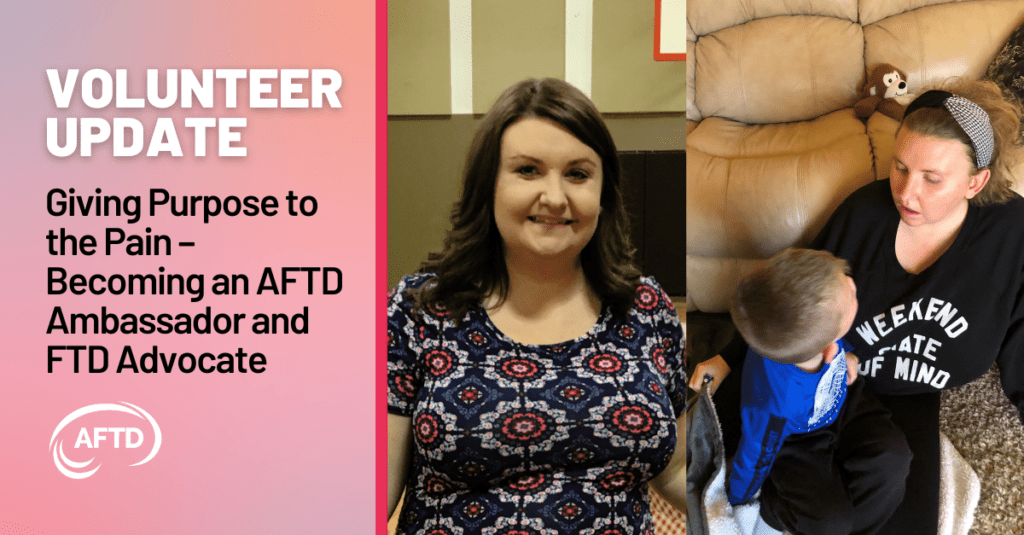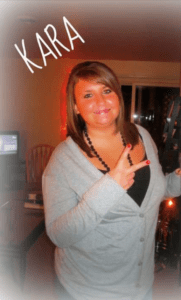Volunteer Update: Giving Purpose to the Pain – Becoming an AFTD Ambassador and FTD Advocate

AFTD Ambassadors know the power of a single story and the healing potential of finding others who understand. Ambassadors are volunteer leaders who represent AFTD in communities across the U.S., raising awareness through their lived experience of FTD while also leveraging their experiences to help others on the FTD journey.
For Dawn Kirby, a former care partner for her daughter Kara, becoming an Ambassador empowered her to come to the aid of those facing FTD in isolation.
“I would say the most meaningful moments come when someone says ‘I don’t feel alone now, someone understands me,’” Kirby told AFTD in a recent interview. “I remember how wonderful that felt when I realized that I was understood, and people understood my daughter Kara. It’s very heartwarming to me to feel that I am providing something good that has come from one of my greatest challenges in life.”

Kirby sat down with AFTD to discuss her motivations to become an Ambassador and shared her thoughts on volunteering.
A Perfect Storm
FTD is the most common form of dementia for people under 60, with symptoms often occurring as people are managing careers and raising families. For Kara, Kirby’s youngest daughter, symptoms began before she had turned 30. The first signs came in 2017 shortly after the birth of Kara’s son, Carson, amid what Kirby referred to as a “perfect storm” of life events that would make diagnosis more difficult.
“We thought she had postpartum depression; she was withdrawn, and her personality was changing,” Kirby said. “But we had also suffered recent losses of family members, so the doctors thought it was just depression. But as her mother, who has known her from the day she was born, I could tell something more was wrong. This was not my daughter; there’s more to this.”
As Kara’s symptoms progressed, she faced a lack of understanding from friends and family, encountering stigma as she struggled with the symptoms of her undiagnosed condition, Kirby said.
“She wasn’t really getting the respect and treatment she needed,” Kirby said. “I felt that no matter if it was FTD or mental illness, she needed respect and understanding for what she was going through.”
Trying to get to the root of Kara’s struggles took time, with visits to different specialists failing to yield results. Eventually, Kirby took Kara to the Mayo Clinic in Rochester, Minnesota, where after being screened by Dr. Bradley Boeve (a member of the AFTD Medical Advisory Council), she was diagnosed with behavioral variant FTD at age 29.
“In some respects, I was relieved to get a diagnosis,” Kirby said. “For over a year and a half, I would wake up each morning telling myself, We’re going to find something to fix her. I went to bed every night defeated, with no clue where we were going next. Dr. Boeve’s diagnosis gave me direction and put a name to the nightmare we had been going through.”

“I Know You Get It”
Kirby sought to get a handle on Kara’s diagnosis by obtaining resources and support through AFTD, which not only provided her with vital information and guidance, but also a community that understood what she was going through. “I immediately felt like I was part of a bigger purpose, and a family,” Kirby told AFTD.
Shortly thereafter, Kirby began her tenure as an AFTD volunteer, first by hosting an event with her sister and husband, then expanding her work to interviews with local media and podcasts. Kirby also hosted an FTD Lunch & Learn at her local mental health clinic, prompting a surge of interest in FTD from her community.
“Volunteering gives purpose to our pain,” Kirby said. “Through my faith, I know there is a plan bigger than I am, and I embrace the fact that the plan won’t always go my way. I appreciate the fact that good things can come from the worst time in our lives; I know that Kara will continue to help others through her participation in ALLFTD and donating her brain.”
Kara passed away on New Year’s Day 2023. The loss hit Kirby hard, but it gave her more passion to bring awareness to FTD and to advocate for families affected by it.
The following spring, Kirby joined the ranks of AFTD’s Ambassadors, raising awareness in rural communities in Illinois and western Indiana in hopes of bringing more timely diagnoses. Kirby said she learned helping others through their FTD journeys, she has been able to heal herself, and has even forged bonds that go far beyond FTD. She mentioned meeting a fellow care partner named Robin, who has become a dear friend.
“I met Robin in AFTD’s closed Facebook group,” Kirby said. “[She] had a son a few years older than Kara who had been diagnosed with FTD. “She gave me her phone number and we talked for hours one night – there were so many similarities between our journeys. It felt amazing to be understood by another mother on the FTD journey.
“The night Robin messaged me that he was gone, I cried my heart out. I felt such a connection to Robin and her son; we could feel each other’s hearts.”
Do What You Can
If you are considering volunteering to raise awareness or support others on the FTD journey, Kirby says that you’ve already made the crucial first step: having a desire to help others. Kirby advises prospective volunteers not to stress; even if you don’t have the tools you need, AFTD and its community will make sure you do. At no point in your volunteer journey are you alone, Kirby said.
Most importantly, Kirby says there is no such thing as “too little” when it comes to volunteering or trying to share your story with others.
“Never feel like what you’re doing isn’t enough,” Kirby said. “Your story will resonate with someone. Mine might resonate with different people than yours, but we all have people out there who will understand what we’ve been through.”
AFTD volunteers donate their time and talents to make the journey easier for the next family and work towards a future free of FTD. Volunteers work hard to deliver support, spread awareness, and make a difference for all affected by FTD.
By Category
Our Newsletters
Stay Informed
Sign up now and stay on top of the latest with our newsletter, event alerts, and more…
